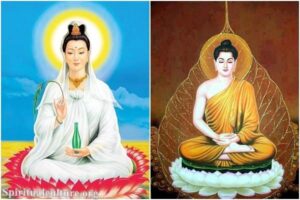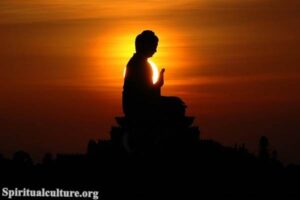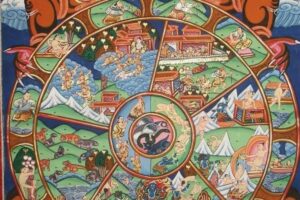Known for his teachings on mindfulness, peace, and compassion, he has touched the lives of countless people around the globe. His teachings, rooted in the tradition of Buddhism, have transcended religious and cultural boundaries, offering a path of peace and mindfulness to anyone who is open to it.
Thich Nhat Hanh’s Influence on Buddhism
Thich Nhat Hanh, often referred to as Thay (teacher) by his students, was born in central Vietnam in 1926. He became a monk at the age of 16 and spent the next seven decades spreading the teachings of Buddhism worldwide. His approach to Buddhism is unique and has often been referred to as ‘Engaged Buddhism,’ a term he coined himself. This concept involves applying the principles of Buddhism to alleviate suffering in the real world, thus making Buddhism a more practical and applicable philosophy for everyday life.
Thich Nhat Hanh’s interpretation of Buddhism is not confined to monastic life or meditation practices alone. Instead, he emphasizes the integration of mindfulness into every aspect of daily life. He teaches that every action, from washing the dishes to walking down the street, can be an opportunity to practice mindfulness and connect with the present moment.
Throughout his life, Thich Nhat Hanh has written over 100 books on Buddhism, mindfulness, and peace, with many being translated into different languages. His books, such as “Peace is Every Step,” “The Miracle of Mindfulness,” and “Living Buddha, Living Christ,” have played a significant role in popularizing Buddhism in the West. His teachings, both written and spoken, have influenced a wide range of people, from laypersons to Buddhist practitioners, from peace activists to educators.
Mindfulness and Peace Activism
Thich Nhat Hanh’s teachings on mindfulness are rooted in the fundamental principles of Buddhism. Mindfulness, as he explains it, is the practice of being fully present and engaged in the moment, free from distraction or judgment. This practice, according to Thich Nhat Hanh, is a pathway to inner peace and understanding. It allows us to experience life more fully, reduce stress, and cultivate a deeper sense of compassion and empathy.
Beyond the individual benefits of mindfulness, Thich Nhat Hanh also emphasizes its role in promoting peace in the world. He believes that inner peace leads to outer peace, and by cultivating mindfulness, we can contribute to a more peaceful world. His peace activism, which began during the Vietnam War, is a testament to his commitment to this belief. He has been nominated for the Nobel Peace Prize by Martin Luther King Jr. and has played a significant role in promoting peace and reconciliation efforts worldwide.
Legacy and Continuing Influence
Thich Nhat Hanh, now in his 90s and retired from public life, left an indelible mark on Buddhism and the world at large. His teachings continue to inspire and guide people on the path of mindfulness and peace. His influence is seen not just in the realm of Buddhism, but also in various fields like education, psychology, and healthcare, where his teachings on mindfulness are being incorporated.
Thich Nhat Hanh’s approach to Buddhism, his teachings on mindfulness, and his unwavering commitment to peace offer a refreshing and much-needed perspective in our often chaotic world. He embodies the essence of Buddhism in his teachings and life, showing us that peace and happiness are possible in every moment, and that every one of us can contribute to creating a more peaceful world.
In conclusion, Thich Nhat Hanh’s contribution to Buddhism and the world is immense. His teachings on mindfulness and peace have offered a lifeline to many seeking solace in this hectic world. His life and work serve as a testament to the transformative power of mindfulness and the potential of Buddhism to address the pressing issues of our time. Thich Nhat Hanh, truly, is a beacon of Buddhism, a symbol of peace, and a guiding light for all of us navigating the path of life.



